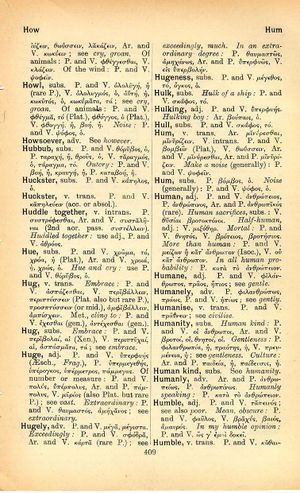human: Difference between revisions
From LSJ
πῶς δ' οὐκ ἀρίστη; τίς δ' ἐναντιώσεται; τί χρὴ γενέσθαι τὴν ὑπερβεβλημένην γυναῖκα; (Euripides' Alcestis 152-54) → How is she not noblest? Who will deny it? What must a woman have become to surpass her?
(CSV4) |
(de4_3) |
||
| Line 7: | Line 7: | ||
<b class="b2">More than human</b>: P. and V. μείζων ἢ κατʼ ἄνθρωπον (Isoc.), V. οὐ κατʼ ἄνθρωπον. | <b class="b2">More than human</b>: P. and V. μείζων ἢ κατʼ ἄνθρωπον (Isoc.), V. οὐ κατʼ ἄνθρωπον. | ||
<b class="b2">In all human probability</b>: P. κατὰ τὸ ἀνθρώπειον. | <b class="b2">In all human probability</b>: P. κατὰ τὸ ἀνθρώπειον. | ||
}} | |||
{{GermanLatin | |||
|dela=human, [[humanus]]. – Adv.[[humane]] od. [[humaniter]]. Vgl. »[[freundlich]], [[gefällig]], [[höflich]]«. | |||
}} | }} | ||
Revision as of 09:08, 15 August 2017
English > Greek (Woodhouse)
adj.
P. and V. ἀνθρώπειος, P. ἀνθρώπινος, Ar. and P. ἀνθρωπικός (rare). Human sacrifices, subs.: V. θυσίαι βροτοκτόνοι. Half-human, adj.: V. μιξόθηρ. Mortal: P. and V. θνητός, V. βρότειος, βροτήσιος. More than human: P. and V. μείζων ἢ κατʼ ἄνθρωπον (Isoc.), V. οὐ κατʼ ἄνθρωπον. In all human probability: P. κατὰ τὸ ἀνθρώπειον.
German > Latin
human, humanus. – Adv.humane od. humaniter. Vgl. »freundlich, gefällig, höflich«.

